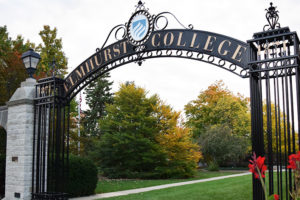
There wasn’t a vacant spot in the pews of Hammerschmidt Memorial Chapel at Elmhurst College on May 30 when Justice Sandra Day O’Connor took the podium for the Rudolf G. Schade Lecture on History, Ethics and the Law.
The first woman to serve on the Supreme Court, O’Connor delivered an impassioned 45-minute talk on her pet cause: an impartial judiciary.
“There is nothing more precious than an independent judiciary,” she declared. “It’s a principle protected by our constitution and recognized around the world. It’s what sets our country apart. Sadly, this is not the rule everywhere. Too many times, our judges are viewed as politicians in robes.”
O’Connor then inveighed against the election of state judges and their perceived role as a “reflection of the popular will.” Just as dangerous, the practice of voting on judges leaves them beholden to the corrupting influence of “big business” and campaign money. Far better to follow the federal system of appointing judges, she said: “The measure of a great judge is not how often the people agree with his or her rulings but how fairly they approach the issues. Their only allegiance must be to upholding the constitution.”
Sharing details of her time on the Court, O’Connor said she made a point of surrounding herself with law clerks from diverse backgrounds and political views. “It assured me of getting the best advice,” she said. A Republican, she expressed pride that President Obama has named three of her former clerks to judgeships.
O’Connor’s appearance at Elmhurst, which drew media coverage from UPI, the Chicago Tribune and Sun-Times Media, began with an informal question-and-answer session with students in the Blume Board Room of the Frick Center. At age 83, she has lost none of her feisty, combative nature. When a student asked whether she thought the John Roberts court had become “politicized,” she shot back: “I wouldn’t say so. Would you? And if so, why?” Ever precise, she responded to the query, “Which was the most memorable case you presided over?” with, ”I never ‘presided’—but I certainly participated!”
Among the more notable cases to which her name was attached were Bush v. Gore, which decided the 2000 election (she voted to end the Florida recount) and Roe v. Wade (her vote helped uphold that decision). She wrote the majority opinion in Grutter v. Bollinger, which held that the University of Michigan Law School’s use of racial preferences in student admissions did not violate the Equal Protection Clause. A reliable part of the Court’s conservative bloc, she was often deemed the “swing vote” during her later years on the bench, though she told the Hammerschmidt audience, “I take umbrage at that. I voted on the issues.”
Appointed to the Supreme Court by President Reagan in 1981, O’Connor retired in 2006 to take care of her husband, who was suffering from Alzheimer’s disease (he died three years later). Since then, she has lectured widely and written several books; her latest, Out of Order, features stories from the Court’s history. Recently, she has devoted herself to her campaign against elected judges and to the cause of civics education in the classroom.
“Civics is vanishing from our public schools; it’s not knowledge passed through the gene pool,” she told the enthusiastic crowd, citing a recent study that found young people could name two out of three judges on American Idol but only one Supreme Court justice. “Another two-thirds couldn’t describe the historical purpose of the Declaration of Independence—even though it’s right in the title!”
To address this problem, O’Connor has launched a website—icivics.org—to “celebrate the system of government in this country.” It’s packed with information and games that, among other things, allow visitors to play the role of a lawyer or a judge. “Best of all,” said O’Connor, “it’s free.”














